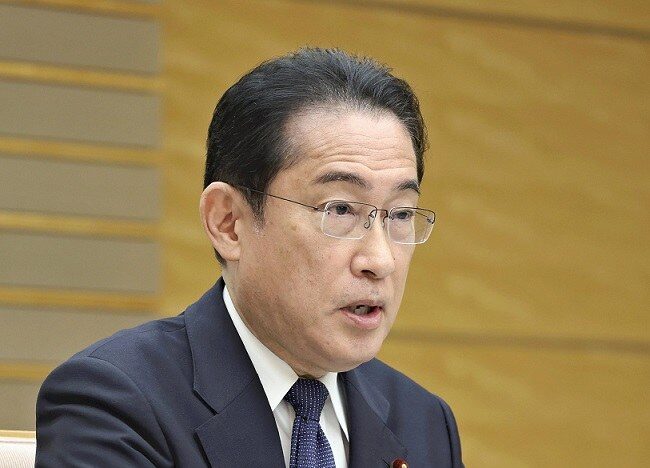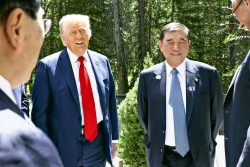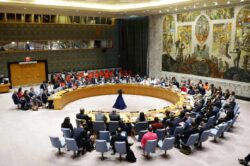
Prime Minister Fumio Kishida speaks during an interview at the Prime Minister’s Office in Tokyo on Monday.
19:20 JST, May 18, 2023
Ahead of the opening of the G7 Hiroshima Summit, Prime Minister Fumio Kishida contributed the following article to The Japan News, outlining his views on what he aims to achieve with the leaders of the countries attending the summit.
G7 leaders are preparing to gather in Japan for the G7 Hiroshima Summit. At a time of historic change and uncertainty, the meeting is an opportunity for the G7 to show that it is united in responding to multiple crises — in terms of climate, pandemic, and geopolitics — that the world is facing.
Two recent experiences reaffirmed to me the importance of the G7’s role in the world today.
During a visit to Ukraine in March, I visited the city of Bucha where I saw the results of Russia’s atrocities with my own eyes. It was a stark reminder that the world must stand against aggression and defend the rule of law.
Soon after, on a visit to Africa in late April and early May, I saw how countries that are striving for economic development are being hampered by soaring prices and shortages of energy and food, crises caused by Russia’s aggression against Ukraine. These challenges have shaken the very foundation of peace and prosperity.
In Hiroshima, I would like to deepen discussions based on the following two perspectives.
The first is to demonstrate our strong determination to uphold the free and open international order based on the rule of law. Vulnerable countries are in greatest need of “the rule of law”; and a state in which the principles of the UN Charter, such as respect for sovereignty and territorial integrity, the peaceful resolution of disputes and the non-use of force are upheld, is the important premise on which “freedom” is enjoyed in the international community. We need to firmly reject any unilateral attempt to change the status quo by force or the threat to use nuclear weapons, as Russia has done, or the use of nuclear weapons.
Russia’s aggression against Ukraine has challenged the fundamental principles of the international order. I am determined to make the Summit a cornerstone for defending them. I have invited President Zelenskyy to participate online, and the G7 will confirm to continue our strong support for Ukraine and strict sanctions on Russia. The G7 will once again strongly urge Russia to immediately and unconditionally withdraw troops from Ukraine. I am also determined to appeal that Russia’s irresponsible nuclear rhetoric is totally unacceptable.
The second is to strengthen the G7’s outreach to the so-called “Global South.” Russia’s aggression has caused major harm to people’s lives around the world, particularly in developing countries. Building trust with these countries requires that we listen to their concerns and address them. With that in mind, I have invited the leaders of eight partner countries, mostly from those called the “Global South,” and the heads of seven international organizations to the G7 Hiroshima Summit for outreach sessions.
Based on these two perspectives, at the G7 Hiroshima Summit, we will address a wide range of issues, including the global economy; energy and food security; regional affairs including Ukraine, and the Indo-Pacific; nuclear disarmament and non-proliferation; economic resilience and economic security; climate change; health; and development. Mainstreaming gender and digitalization will also be important topics in what will be an intensive three days of discussions.
This Summit in Japan, the only Asian country in the G7, is also an opportunity to focus on the Indo-Pacific.
Our region is driving global growth, but it faces various security and economic challenges. I look forward to in-depth discussions and to reaffirming the G7’s coordination to realize a “Free and Open Indo-Pacific” (FOIP). Robust discussion is needed to align G7 members on regional issues, including those related to East Asia such as China and North Korea.
Japan’s goal is to lead the international community in the direction of cooperation rather than division and confrontation and to enhance cooperation to realize the FOIP vision. To that end, I recently announced a new plan for FOIP when I visited India.
Among the initiatives that I am promoting is the mobilization of private finance, through the introduction of new tools for Official Development Assistance (ODA) that mobilize both public and private finance for sustainable development.
In the area of infrastructure investment, where there are huge unmet needs in the region, Japan will mobilize a total of more than 75 billion US dollars in public and private finance by 2030, helping countries in the Indo-Pacific region to grow together sustainably.
There is no better place to express our commitment to world peace than Hiroshima.
It has been 77 years since the atomic bombings of Hiroshima and Nagasaki, and I want to send a strong message to the world that the record of non-use of nuclear weapons must not be ignored.
I intend to deepen discussions among G7 leaders toward a world without nuclear weapons. To realize that ideal of a world without nuclear weapons, what is important is to foster international momentum by persistently promoting realistic and practical efforts.
The G7 must also take a lead in providing solutions to achieve sustainable growth. That is especially true at a time of uncertainty caused by geopolitical risks, inflation and other challenges.
The world is facing challenges in ensuring stable energy and resilient supply chains, as well as in tackling climate change.
I would like to take the opportunity of the G7 Hiroshima Summit to discuss the importance of promoting public-private collaboration and international cooperation, so that the G7 will be able to take the lead in promoting sustainable development.
Economic resilience and economic security are important parts of the agenda, and at the Hiroshima Summit they will be squarely discussed for the first time in the history of G7 summit meetings.
As the world faces crises such as the pandemic and Russia’s aggression against Ukraine, we must be prepared for economic security risks, such as disruptions to the supply of critical resources and the vulnerabilities that arise from economic interdependency.
Climate change is a challenge of utmost importance because it puts the lives and futures of people around the world at risk.
While the importance of ensuring energy security is reaffirmed in the face of Russia’s aggression against Ukraine, the goal to achieve net-zero GHG emissions by 2050, based on the Paris Agreement, remains unchanged. It is essential to show the various pathways toward decarbonization that ensures energy security, recognizing the need to utilize all appropriate energy sources and technologies as well as the geopolitical risks.
Other important issues that have to be addressed at the Summit include food, health, development, gender mainstreaming, and improving the governance of digital technology, which continues to evolve as seen in the rapid development of artificial intelligence (AI).
As the international community is facing the multiple crises, the G7 Hiroshima Summit is a precious opportunity for G7 leaders to express their determination to defend the free and open international order based on the rule of law, and to offer solutions to ensure a better future for everyone in close cooperation with the countries called the “Global South” and other partners. I, as chair of the G7 Hiroshima Summit, am determined to exert leadership in that effort.
Top Articles in Politics
-

Japan PM Takaichi’s Cabinet Resigns en Masse
-

Sanae Takaichi Elected Prime Minister of Japan; Keeps All Cabinet Appointees from Previous Term
-

Japan’s Govt to Submit Road Map for Growth Strategy in March, PM Takaichi to Announce in Upcoming Policy Speech
-

LDP Wins Historic Landslide Victory
-

LDP Wins Landslide Victory, Secures Single-party Majority; Ruling Coalition with JIP Poised to Secure Over 300 seats (UPDATE 1)
JN ACCESS RANKING
-

Japan PM Takaichi’s Cabinet Resigns en Masse
-

Japan Institute to Use Domestic Commercial Optical Lattice Clock to Set Japan Standard Time
-

Israeli Ambassador to Japan Speaks about Japan’s Role in the Reconstruction of Gaza
-

Man Infected with Measles Reportedly Dined at Restaurant in Tokyo Station
-

Videos Plagiarized, Reposted with False Subtitles Claiming ‘Ryukyu Belongs to China’; Anti-China False Information Also Posted in Japan






















